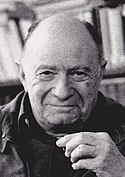Jacques Ellul Quote
The propagandist naturally cannot reveal the true intentions of the principal for whom he acts... That would be to submit the projects to public discussion, to the scrutiny of public opinion, and thus to prevent their success... Propaganda must serve instead as a veil for such projects, masking true intentions.
Jacques Ellul
The propagandist naturally cannot reveal the true intentions of the principal for whom he acts... That would be to submit the projects to public discussion, to the scrutiny of public opinion, and thus to prevent their success... Propaganda must serve instead as a veil for such projects, masking true intentions.
Related Quotes
Just because something isn't a lie does not mean that it isn't deceptive. A liar knows that he is a liar, but one who speaks mere portions of truth in order to deceive is a craftsman of destruction.
Criss Jami
Tags:
agenda, bad influence, compulsive liar, controlling, craftsman, deception, destruction, dishonest, influence, lies
About Jacques Ellul
Jacques Ellul (; French: [ɛlyl]; January 6, 1912 – May 19, 1994) was a French philosopher, sociologist, lay theologian, and professor. Noted as a Christian anarchist, Ellul was a longtime professor of History and the Sociology of Institutions on the Faculty of Law and Economic Sciences at the University of Bordeaux. A prolific writer, he authored more than 60 books and more than 600 articles over his lifetime, many of which discussed propaganda, the impact of technology on society, and the interaction between religion and politics.
The dominant theme of Ellul's work proved to be the threat to human freedom and religion created by modern technology. He did not seek to eliminate modern technology or technique but sought to change our perception of modern technology and technique to that of a tool rather than regulator of the status quo. Among his most influential books are The Technological Society and Propaganda: The Formation of Men's Attitudes.
Considered by many a philosopher, Ellul was trained as a sociologist, and approached the question of technology and human action from a dialectical viewpoint. His writings are frequently concerned with the emergence of a technological tyranny over humanity. As a philosopher and theologian, he further explored the religiosity of the technological society. In 2000, the International Jacques Ellul Society was founded by a group of former Ellul students. The society, which includes scholars from a variety of disciplines, is devoted to continuing Ellul's legacy and discussing the contemporary relevance and implications of his work.
The dominant theme of Ellul's work proved to be the threat to human freedom and religion created by modern technology. He did not seek to eliminate modern technology or technique but sought to change our perception of modern technology and technique to that of a tool rather than regulator of the status quo. Among his most influential books are The Technological Society and Propaganda: The Formation of Men's Attitudes.
Considered by many a philosopher, Ellul was trained as a sociologist, and approached the question of technology and human action from a dialectical viewpoint. His writings are frequently concerned with the emergence of a technological tyranny over humanity. As a philosopher and theologian, he further explored the religiosity of the technological society. In 2000, the International Jacques Ellul Society was founded by a group of former Ellul students. The society, which includes scholars from a variety of disciplines, is devoted to continuing Ellul's legacy and discussing the contemporary relevance and implications of his work.
